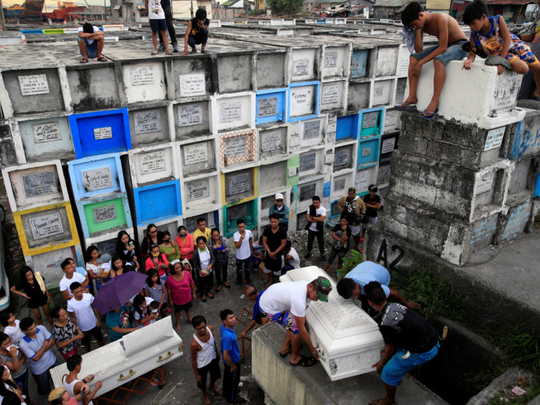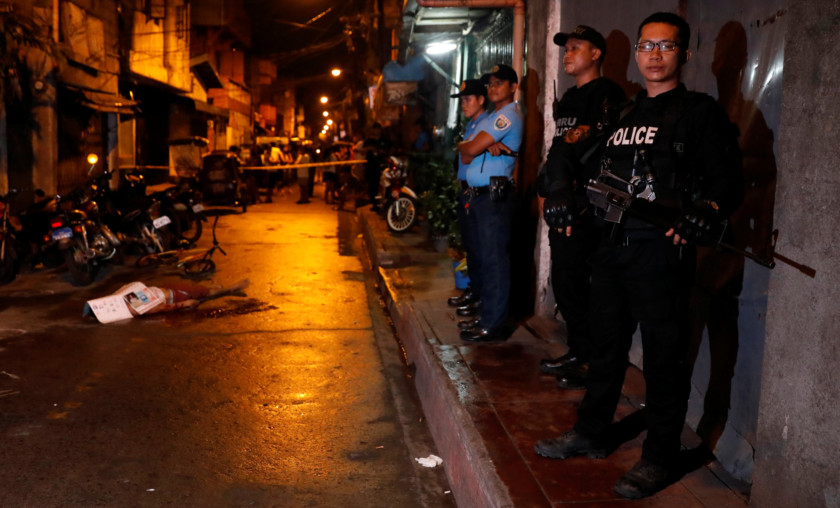
NAVOTAS, Philippines
Eric Clapton’s Tears in Heaven played over a loudspeaker as pallbearers lifted the casket of Ronnel Jaraba out of the hearse and carried it into the depths of the San Jose Catholic Cemetery for burial.
Under a glaring sun, the casket was opened one last time as the mourners, many dressed in black shirts, said goodbye. His father leant over the body, sobbing, repeating the same words: “I did everything! I didn’t lack in anything!”
The burial followed a wake that lasted 12 days — as Jaraba’s family desperately tried to raise money for the funeral.
Found with a gunshot wound through the eye, he was believed to be one of the more than 7,000 victims of President Rodrigo Duterte’s “drug war,” carried out by the police and vigilante groups. Duterte has promised to rid the Philippines of drugs and the crime associated with the drug trade.
But the war on drugs here has been labelled a war on the poor, and generating the money for a final resting place can be too difficult for some families.
Haggling for price
In Jaraba’s case, first the family “haggled” with the funeral home to bring down the price for services from $1,000 (Dh3,673) to about $750, said his older brother Rizaldino Jaraba, 40.
But wakes have associated costs, such as food for guests. The family held a wake that was twice as long as normal as they tried to find a way to raise money for the actual burial.
Through the family of another victim, they got help from a church programme that helps with burial costs. Otherwise, they didn’t know what they would do. “We were afraid; that’s why we sought someone we could ask for help,” Rizaldino Jaraba said.
The average family income for drug users in the Philippines is just over $200 a month, according to a January report by Amnesty International that cited government statistics.
An anti-drugs police officer told the rights group of a scheme in which funeral homes give authorities a kickback for each body, incentivising the police to seek out pricey funeral homes when cheaper ones might exist.
“Sometimes, if I’m the investigator, I’ll bring the body to the biggest and most expensive [funeral home], because they give the biggest cuts,” the officer reportedly said.
Orly Fernandez, the manager at Eusebio’s Funeral Home, a business accredited with law enforcement, denied that there are kickbacks, saying it would be difficult for funeral homes to make any money if that were the case. Dante Lubiciano, the chief of police in Navotas, one of the communities most affected by the drug war, said he was unaware of the alleged arrangement.
“This is the first time that somebody like you called me and tell [me about] that kind of problem,” he said.
Duterte vowed to refocus his attention on corrupt police after a South Korean businessman was killed, allegedly by police, in October, sparking a diplomatic scandal and prompting the president to consider bringing in the military to deal with his drug war. In the interim, the killings have slowed but not stopped.
Card games
At a traditional wake in the Philippines, card games are held to keep visitors occupied, and a portion of the winnings is allotted to the bereaved family. The stakes, however, are normally small, and not enough to cover the costs of a funeral package.
One day last week, Aileen Aquino, 19, was sitting by the casket of her husband, Mark Christian Mesias, in Metro Manila’s Quezon City as players shuffled and dealt cards nearby.
“We still have a problem with his burial,” she said. “We just need money for the place where he will be buried.”
Mesias was shot four times in the head, and 17 bullets were recovered from his body, she said, adding that the autopsy showed the bullets came from different guns.
Although the family was still in need, she felt relatively more fortunate than others who had to make more drastic choices. Some wakes have lasted weeks, while other families could not even afford them. “They didn’t even have a casket,” she said of an acquaintance whose relative was also killed as part of the drug war. “It was just a wooden box that they used to bury ... They just buried that one in the back yard because they really had no money at all.”
In the Navotas Public Cemetery, there have been several mass burials for victims whose bodies were unclaimed. A man living at the cemetery said the bodies arrived in trucks.
The Baclaran Church in Manila has set up a programme to help families with funeral costs.
Programme coordinator Dennis Febre said the church had always offered support but that the drug war compelled it to allot more help for victims of extrajudicial killings.
“We cannot wait for government agencies to help,” he said. “These are the poor people who cannot even afford to buy their food for the day.”
He said the church has spent more than 1 million pesos, or nearly $20,000 (Dh73,460), helping families.
“It doubles, or triples even, [compared with] the number of those clients that we experienced [before],” he said.
Jaraba’s family was one of the recipients. They are thankful not to be in debt. But they are in pain.
“We can’t do anything about this. We don’t know the identity [of the killers]. My brother will be an unsolved case,” Rizaldino Jaraba said.
“We already accepted it, the hardship. We’ll feel it for the rest of our lives.”
— Washington Post












